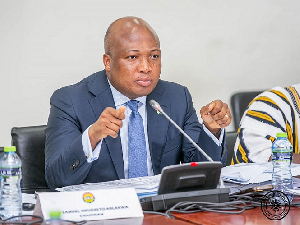Government’s determination to avoid the perennial election year fiscal indiscipline appears to be showing visible cracks after portions from a raft of new tax measures meant to shore up revenue were withdrawn following strong public disapproval.
The new tax measures were passed last year -- but implementation was pushed to after the Christmas and New Year holidays -- and sought to introduce new tax rates for returns on investments, commissions earned by sales personnel, and a host of other measures.
But a Ministry of Finance statement issued on Monday said government’s decision to impose a 1 percent withholding tax on interest earned by individuals on their investments will not be implemented after all.
“Following passage of the Income Tax Act, 2015 (Act 896) in September 2015, government has taken note of taxpayers and the general public’s concerns on some provisions of the Act; especially those relating to the withholding tax on the provision of services and payment of tax on interest paid to individuals.
“On the issue of a 1 percent tax imposition on interest earned by individuals, government has already submitted proposals for Parliament to reverse the position,” the statement said.
The new income tax regime is expected to contribute a significant part of government’s GH¢12billion tax revenue from income and property.
The move by government to put on hold aspects of this new income tax law following public outrage shows its vulnerability in implementing key reforms during a year in which it will be seeking a renewal of its mandate.
In addition to the new income tax regime, there were significant adjustments in utilities as well as the imposition of new taxes on fuel prices which saw massive price hikes -- much to the disapproval of consumers.
The announcement of increases in electricity and water tariffs to 59.2 percent and 67.2 percent respectively by the Public Utilities Regulatory Commission (PURC), took effect on December 14, 2015, while the average 25 percent petroleum increase became effective yesterday.
The fuel increases were occasioned by passage of the Energy Sector Levy, 2015, by Parliament last December.
With the International Monetary Fund (IMF) set to meet on January 13th for a second review of the country’s US$918million fund programme, moves by government to pass on recent hikes in utilities to consumers, as well as introduce new taxes on petroleum products, is intended to send a signal to the Fund that government’s intention is to not compromise the ongoing programme because of the upcoming elections.
The two decisions and not backtracking on the withholding tax for interest on investment, government hopes, will demonstrate its resolve to take unpopular decisions to save the economy even if it has the potential of costing it in the general elections.
President John Mahama will be seeking a second 4-year term on November 7th, and has consistently maintained that his government will maintain the needed fiscal discipline after the last election left government with an excess of 11 percent budget deficit.
The deficit incurred in the last elections was so wide that its effects cascaded into subsequent years, finally prompting government to turn to the Washington-based lender in 2014 for assistance to solve the widening deficit.
This year, Finance Minister Seth Terkper is projecting that the budget deficit will drop from 7.3 in 2015 to about 5.3 percent this year, and then to about 3.7 percent in 2017.
Click to view details



Business News of Wednesday, 6 January 2016
Source: thebftonline.com
Election year discipline shows cracks
Entertainment
















